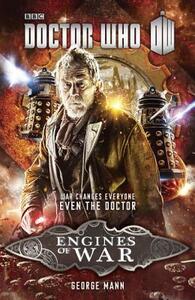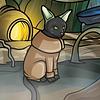Take a photo of a barcode or cover
I must confess I am a huge fan of Doctor Who so when I saw this book in Barnes and Noble I knew I had to buy it.
It was a good read that felt just like watching an episode of the show. It was also nice to read about The War Doctor. A Doctor that hasn't been shown much on screen but I do believe he has shown up in Comic Books, maybe. Which I may have to delve into eventually.
The only true downside of this book was at times it did feel a bit slow and like it was dragging. But not too much that I would take away from the rating.
It was a good read that felt just like watching an episode of the show. It was also nice to read about The War Doctor. A Doctor that hasn't been shown much on screen but I do believe he has shown up in Comic Books, maybe. Which I may have to delve into eventually.
The only true downside of this book was at times it did feel a bit slow and like it was dragging. But not too much that I would take away from the rating.
The quality of this audiobook is excellent, and the narrator was brilliant - bringing to life a doctor we hardly knew.
The story started off well, but suffers the same as the TV series. They just need to make everything grander - to beat what has gone on before. We get the Daleks back again - but new ones (as far as i know - as this is my first Doctor Who book). If they just had some normal Daleks and a toned down plot then this would have increased by a star.
I may listen to more in the future - but only if they are on offer like this one.
The story started off well, but suffers the same as the TV series. They just need to make everything grander - to beat what has gone on before. We get the Daleks back again - but new ones (as far as i know - as this is my first Doctor Who book). If they just had some normal Daleks and a toned down plot then this would have increased by a star.
I may listen to more in the future - but only if they are on offer like this one.
This is a really fantastic book! It's well written, well paced and gives a voice to the War Doctor who doesn't have much of one. I really enjoyed seeing things from his perspective and the buildup to decisions made in "The Day of the Doctor". I also really enjoyed Cinder as a character and a companion. ... for the most part. And I am totally on-board for 98% of the book. I can almost forget it was written in what was solidly a Moffat era. ... almost. And that's where the 2% comes in.
Which basically amounts to Cinder's characterization. Despite hating Time Lords and the Daleks for destroying her home/family, she completely forgives him for saving the Daleks. I wouldn't have minded that so much if it was a process, but it's immediate. Like oh, I can't blame you. :< Which is very Moffat era Who where companions act as part of what I like to call the Cult of the Doctor.
They know he is the most amazing thing ever. They are there to remind him of why he's actually a very good man and give him back pats. Occasionally, if drama warrants it, to hint that he is a bad man because of the things he lures people into-- but is actually, at the end of the day, a Hero. And this is what he believes because he's a Hero. And he gets Encouragement.
Cinder falls into this trap more than once near the end and goes from a dynamic interesting character into someone who is 115% in the Doctor's arena. Which is annoying as well as a missed opportunity. (as well as not putting someone in that dalek casing) It was interesting that she died for him. (But blood? From an energy weapon? How dramatic. And did he have to wail) and that her sacrifice sort of pushed him Momentward-- but at the same time I wish it had been something other or more than her that pushed him toward that. I could see it building up to that but, for me, there wasn't enough of a push.
Still it's a great read and I enjoyed it quite a bit!
They know he is the most amazing thing ever. They are there to remind him of why he's actually a very good man and give him back pats. Occasionally, if drama warrants it, to hint that he is a bad man because of the things he lures people into-- but is actually, at the end of the day, a Hero. And this is what he believes because he's a Hero. And he gets Encouragement.
Cinder falls into this trap more than once near the end and goes from a dynamic interesting character into someone who is 115% in the Doctor's arena. Which is annoying as well as a missed opportunity. (as well as not putting someone in that dalek casing) It was interesting that she died for him. (But blood? From an energy weapon? How dramatic. And did he have to wail) and that her sacrifice sort of pushed him Momentward-- but at the same time I wish it had been something other or more than her that pushed him toward that. I could see it building up to that but, for me, there wasn't enough of a push.
Still it's a great read and I enjoyed it quite a bit!
The (Great) Time War rages on and entire planets are destroyed in the crossfire. The Time Lord who no longer believes he deserves the moniker 'The Doctor' crash lands on a planet ravaged by the Daleks. He meets a member of the resistance named Cinder and the two of them race against the clock, i.e. the Time Lords (see what I did there?) back on Gallifrey and the Daleks, to stop mass genocide. For those of you who wanted more background on the War Doctor that was introduced in Day of the Doctor then this one is definitely for you.
It was a no-brainer that War Doctor, and specifically, stories of the Time War, would make good stories, and this book did not disappoint. The strength of Doctor Who novels lies in their ability to expand what you know and add depth to the characters beyond what TV can accomplish. In this, Mann does a fantastic job and creates an enjoyable novel for any Whovian.
Usually when I read tie-in novels I tend to avoid Doctor Who, because they're usually really not good. But I am still eternally sad that we will never see more of the War Doctor than his brief appearance in The Day of the Doctor so I broke my own rule.
And actually this was really pretty good. It's always great to see the Time War in full force and I love anything that involves the Time Lords. This book showcases nicely what the Time Lords would have been like during a war, what the Doctor would have been like during a war and brings in some cool aspects of Gallifreyan history.
I will say that the dialogue they gave the Doctor doesn't always match the very precise and kind of formal way of speaking in John Hurt's performance, though there's so little to go on with his character that it's not as jarring as if they had gotten a different Doctor totally wrong. His personality underneath that, though, is exactly what I imagined the War Doctor to be like from what little we were given and I thoroughly enjoyed getting to know him. More please! It was nice getting back in after I really wasn't a fan of the last series at all.
And actually this was really pretty good. It's always great to see the Time War in full force and I love anything that involves the Time Lords. This book showcases nicely what the Time Lords would have been like during a war, what the Doctor would have been like during a war and brings in some cool aspects of Gallifreyan history.
I will say that the dialogue they gave the Doctor doesn't always match the very precise and kind of formal way of speaking in John Hurt's performance, though there's so little to go on with his character that it's not as jarring as if they had gotten a different Doctor totally wrong. His personality underneath that, though, is exactly what I imagined the War Doctor to be like from what little we were given and I thoroughly enjoyed getting to know him. More please! It was nice getting back in after I really wasn't a fan of the last series at all.
For Fans of Doctor Who this has to be a must read. A story that fills in some of the gap and explains just how he can have been pushed so far that he has no alternative but to do whatever it takes to end the Time War.
This tale works for casual readers but it can offer much more to fans. Among other details it explores just what Rassilon's final solution is and how this involved Borusa. Bringing the Time War to the forefront was always going to be risky. It had to convey the mind-numbing terror to the whole universe as well as balance the horror of both Daleks and Time Lords in an ever-shifting stale-mate. George Mann manages this suberbly.
This tale works for casual readers but it can offer much more to fans. Among other details it explores just what Rassilon's final solution is and how this involved Borusa. Bringing the Time War to the forefront was always going to be risky. It had to convey the mind-numbing terror to the whole universe as well as balance the horror of both Daleks and Time Lords in an ever-shifting stale-mate. George Mann manages this suberbly.
Lovely to see a Doctor Who story featuring John Hurt's 'War Doctor'.
Let’s begin with a disclaimer that I read this because my dad gave it to me as a Christmas gift. I don’t, generally, read media tie-in novels—or comics. Despite my abiding desire to continue Buffy or Farscape, I just can’t do it. I read—and greatly enjoyed—many of the Star Trek novels when I was a child. Nevertheless, I find that the actors bring something to their portrayal of a character that not even the best writer can capture. (The best novels are the ones by writers who manage to come close.) In the physicality of the performance, the way the actors make use of the set and the reactions of other characters, we receive so much more than mere narration and dialogue can convey.
Now, Doctor Who: Engines of War is a War Doctor novel, so that makes things more interesting. With only the one television appearance of the War Doctor, we don’t have much to go on. So George Mann has a little more latitude. That being said, I think John Hurt did an amazing job during the 50th anniversary special. So does Mann manage to capture the way the Doctor’s enthusiasm is constantly bubbling to the surface, even in this, his most serious of incarnations?
I don’t know. I don’t really have any experience to judge this sort of thing. The Doctor in this novel is just not my Doctor (any of them) because he isn’t on TV. It’s more like I’m reading Doctor Who fan-fiction … just officially sanctioned fan-fiction.
Thematically, this is a very strong work. Engines of War leads into The Day of the Doctor, showing us the events that finally galvanized the Doctor into using the Moment. As usual, it’s not the fate of billions that moves the Doctor so much as it is the sacrifice of a single human being. Time and again, we see the Doctor’s companions act as mirrors for his own morality—stopping him when he is going too far, and pushing him on when he hasn’t gone far enough.
For Doctor Who fans, this is a book full of continuity references. The Doctor’s attitude, and the Time War itself, has its origins in his fateful decision not to abort the creation of the Daleks way back in Genesis of the Daleks. That was one of the most tense moments of the entire show, and so much interesting drama has since developed out of that one question of morality.
Now on Moldox we see the Daleks testing a super-weapon that is meant to wipe out Gallifrey and win them the Time War. The Time Lords want to stop that, but with collateral damage of the billions of humans in that system. The Doctor, of course, can’t stand for that. Mann further develops the idea planted in the new series that the Time War changed the Time Lords for the worse, particularly after they resurrected the ruthless Rassilon to lead them.
The plot, by comparison, underwhelms—though I find that’s pretty common, even with the television episodes. Lots of running to and fro, little clever conversations with various characters, and then a bombastic climax in which the Doctor manages to scrape through on his brilliance and—more often than not—his companions’ heroism. It’s an easy read.
That’s about it. If you like Doctor Who, there is a lot you will enjoy in this book. If you like these novels, I suspect you’ll find this a good one. This has not changed my mind about Doctor Who novels or other tie-in novels. It was the palate-cleanser I was looking for, but I don’t feel as enriched by it as I do with most books.

Now, Doctor Who: Engines of War is a War Doctor novel, so that makes things more interesting. With only the one television appearance of the War Doctor, we don’t have much to go on. So George Mann has a little more latitude. That being said, I think John Hurt did an amazing job during the 50th anniversary special. So does Mann manage to capture the way the Doctor’s enthusiasm is constantly bubbling to the surface, even in this, his most serious of incarnations?
I don’t know. I don’t really have any experience to judge this sort of thing. The Doctor in this novel is just not my Doctor (any of them) because he isn’t on TV. It’s more like I’m reading Doctor Who fan-fiction … just officially sanctioned fan-fiction.
Thematically, this is a very strong work. Engines of War leads into The Day of the Doctor, showing us the events that finally galvanized the Doctor into using the Moment. As usual, it’s not the fate of billions that moves the Doctor so much as it is the sacrifice of a single human being. Time and again, we see the Doctor’s companions act as mirrors for his own morality—stopping him when he is going too far, and pushing him on when he hasn’t gone far enough.
For Doctor Who fans, this is a book full of continuity references. The Doctor’s attitude, and the Time War itself, has its origins in his fateful decision not to abort the creation of the Daleks way back in Genesis of the Daleks. That was one of the most tense moments of the entire show, and so much interesting drama has since developed out of that one question of morality.
Now on Moldox we see the Daleks testing a super-weapon that is meant to wipe out Gallifrey and win them the Time War. The Time Lords want to stop that, but with collateral damage of the billions of humans in that system. The Doctor, of course, can’t stand for that. Mann further develops the idea planted in the new series that the Time War changed the Time Lords for the worse, particularly after they resurrected the ruthless Rassilon to lead them.
The plot, by comparison, underwhelms—though I find that’s pretty common, even with the television episodes. Lots of running to and fro, little clever conversations with various characters, and then a bombastic climax in which the Doctor manages to scrape through on his brilliance and—more often than not—his companions’ heroism. It’s an easy read.
That’s about it. If you like Doctor Who, there is a lot you will enjoy in this book. If you like these novels, I suspect you’ll find this a good one. This has not changed my mind about Doctor Who novels or other tie-in novels. It was the palate-cleanser I was looking for, but I don’t feel as enriched by it as I do with most books.
Never thought a book based on a tv show could be this good. If you're a Doctor Who fan, this is a must read.





